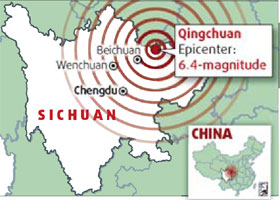Strong aftershock destroys 71,000 homes, 6 killed
(Agencies)
Updated: 2008-05-26 06:47
Updated: 2008-05-26 06:47
CHENGDU, China -- A powerful aftershock destroyed tens of thousands of homes in China on Sunday, killing six people and straining recovery efforts from the country's worst earthquake in three decades. Nearly a thousand were injured.
|
|
Meanwhile, soldiers rushed with explosives to unblock a debris-clogged river threatening to flood homeless quake survivors.
The aftershock measuring 6.4 on the Richter scale is the strongest since the 8.0-magnitude Wenchuan County quake on May 12, and like the original quake, was felt across China.
The new tremor killed six people and injured nearly one thousand, the Xinhua News Agency said.
In Qingchuan County of Sichuan, the epicenter of the aftershock, one was killed and more than 700 people had been injured while nine villages and towns suffered telecommunication cutoff, according to the disaster relief headquarters in the county.
In Guangyuan City of Sichuan, some 71,000 homes that had survived the original quake were leveled, and another 200,000 were in danger of collapse from the aftershock that caused office towers to sway in Beijing, 800 miles away.
Four people were confirmed dead and 20 others were seriously injured in Hanzhong city of northwest China's Shaanxi Province when the aftershock jolted Qingchuan County of southwestern Sichuan Province on Sunday afternoon, said an official with Hanzhong city Monday.
Hu Runze, mayor of Hangzhong, said all the four dead were in a paddy field of Xixiang County when the aftershock occurred.
Longnan City in northwest Gansu Province reported one death and 109 injuries with 15 in serious condition. The victim was killed by the rolling stones from a mountain.
|
|
Before the aftershock, the confirmed death toll from the disaster had risen to 62,664, with another 23,775 people missing. Premier Wen Jiabao has warned the number of dead could surpass 80,000.
A mudslide caused by the aftershock blocked a road, but Xinhua said no serious landslides were reported.
 Previous landslides loosened by the quake jammed rivers across the disaster area, creating 35 new lakes that placed 700,000 survivors in jeopardy of floods, Vice Minister of Water Resources E Jingping told reporters in Beijing.
Previous landslides loosened by the quake jammed rivers across the disaster area, creating 35 new lakes that placed 700,000 survivors in jeopardy of floods, Vice Minister of Water Resources E Jingping told reporters in Beijing.
The biggest concern was the new Tangjiashan lake in Beichuan county, where some 1,600 police and soldiers were hiking with 22 pounds of explosives each to blast through debris, according to Xinhua.
Hazy weather prevented helicopter flights to the area, and forecasts for rain increased the risk that lakes could overflow.
Rain will "not only cause the amount of water going into the lakes to increase, but also influence their normal structure, so the situation is quite serious," said Vice Minister E. "It is a daunting task because of the unpredictability of when the barrier lakes will burst."
|
||
|
||
|
|
|
|



